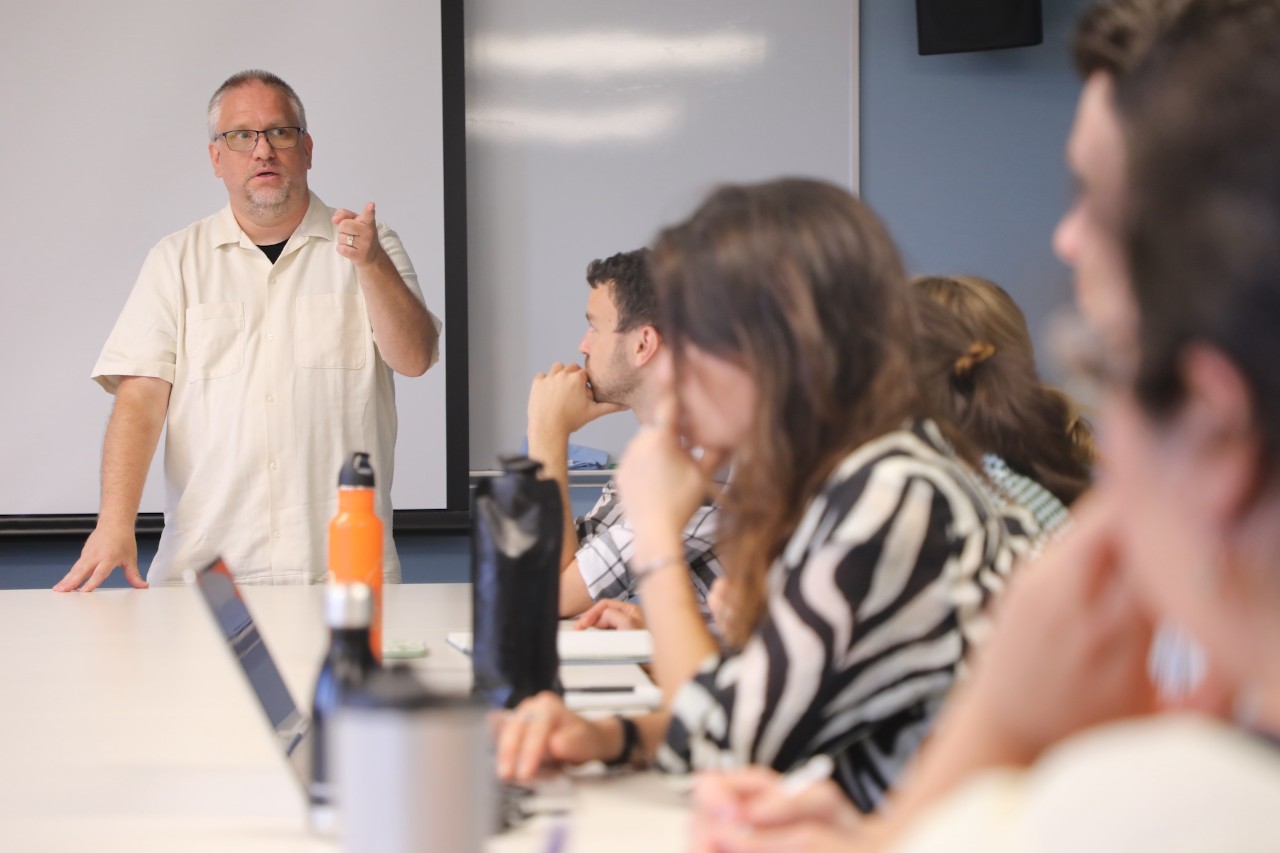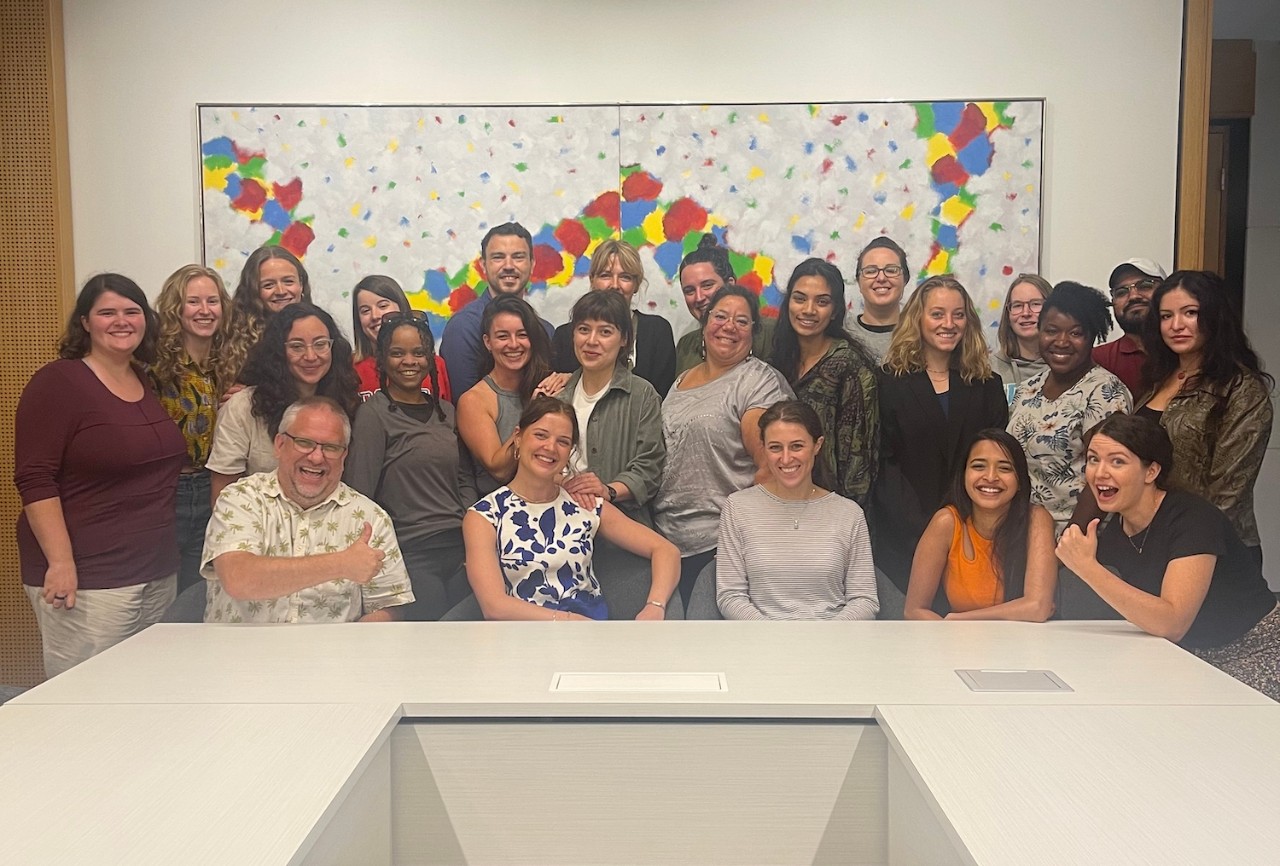Concordia's Science Journalism summer school offers “immersive and unconventional” student experience
 The school's academic leader Dr. David Secko (left) teaching during Projected Futures. Photo by Robin Della Corte.
The school's academic leader Dr. David Secko (left) teaching during Projected Futures. Photo by Robin Della Corte.
The Department of Journalism’s Projected Futures was designed with the goal to expose participants to the foundations of evidence-based science journalism and challenge them to rethink how science is communicated with society.
Seven years later, it is a two-time award-winning experiential international graduate science journalism summer school that is popular among students from diverse disciplines across the globe. This year, the school will run from July 29 to August 2 in Montreal.
Science Journalism Professor Dr. David Secko, academic leader of the program, attributes its success to the students it attracts.
“After speaking to scientists and journalists from around the world for many years, it was clear we needed to inject fresh perspectives into science communication,” says Secko. “We realized in the right environment, students would bring a marvelous set of testable ideas, and learn to be science journalists in the process.”
“The school is unique worldwide, and its focus on our collaborative future continues to bring diverse students to beautiful Montreal each summer.”
Projected Futures is open to all local, national and international students from any discipline who are interested in new forms of scientific storytelling and interdisciplinary experimentation.
Participants learn the ropes of science journalism theory, all while developing multi-media storytelling skills from writing to podcasting, to social media production and freelance story pitching all in one week.
Students also engage in guest workshops from high-profile science journalists on various topics in science journalism, all while building a diverse network of science journalists.
Past speakers have included Nahlah Ayed, Roxanne Khamsi, Hannah Hoag, Chloë Ranaldi, Laura Helmuth, Dan Fagin, Jay Ingram, Ivan Semeniuk, André Picard, Tom Lundy, Siri Carpenter, Apoorva Mandavilli and Jennifer Gardy.
Digital Journalism Instructor Cristina Sanza, who coordinates Projected Futures, says each year, she is inspired by the students.
“The experimental nature of it all always makes it a memorable learning experience, not just for the students, but for Dave and I, too,” Sanza says.
“People all around the world are seeing the impact that good science journalism can have, whether it's helping to save lives or inspire people. We hope our students feel empowered to be part of this movement.”
Students from diverse, international disciplines across the globe
Projected Futures 6 hosted last summer consisted of its largest cohort yet.
Kathi Bellstedt from Germany was one of the students who participated. She came to the program with a bachelor’s in communication studies and political studies and research background in hate speech, populism, misinformation and disinformation.
“It was a very interesting mix with people from so many backgrounds. We really had the chance to learn from each other's topics and work,” Bellstedt says.
“Recent global issues showed us how easy it actually is to spread misinformation. There are so many complex topics in the world and, as a journalist, I need to know how to explain them to the audience.”
 The Projected Futures 6 cohort. Photo by Robin Della Corte.
The Projected Futures 6 cohort. Photo by Robin Della Corte.
Celia Payne from British Columbia came to Projected Futures with two undergraduate degrees in English and Kinesiology and Fitness Leadership. Her research focuses on aging populations and community health.
“Projected Futures surpassed my expectations, providing an immersive and empowering experience,” Payne says.
“The assignments were immersive, unconventional, and crafted to foster creative thinking. Access to workshops, industry leaders, esteemed graduates of Journalism programs, past Projected Futures participants, and top-notch facilities significantly enriched the learning experiences. My collaborative group work experiences were exceptionally positive, delivering invaluable returns on the time and effort invested.”
PhD Candidate at Concordia University Alexander Albury came to Projected Futures with a research background in cognitive psychology, particularly music cognition and neuroscience.
He had previously participated in numerous science communication workshops, but Albury says Projected Futures was quite different from anything he had experienced.
“What really made Projected Futures different for me was the glimpse it gave me into the world of journalism,” Albury says.
“As a scientist and researcher, I had only approached science communication from one perspective. Projected Futures introduced me to the science of journalism and gave me a peak into how journalists approach storytelling.”
Science Journalism growing research in department
The department’s Science Journalism Hub, which hosts Projected Futures, a Minor in Science Journalism and the Concordia Science Journalism Project, among other initiatives, is a testament to the growing demand for science journalism education.
“Science journalism education is about giving students the skills they need to connect us to a changing world,” Secko says. “And thereby build public confidence in science and journalism.”
Apply for Projected Futures 7.
Find out more about Concordia’s Department of Journalism.
Find out more about Concordia’s Science Journalism Hub .